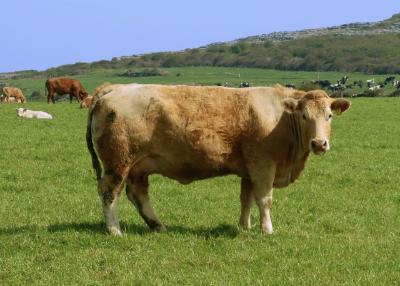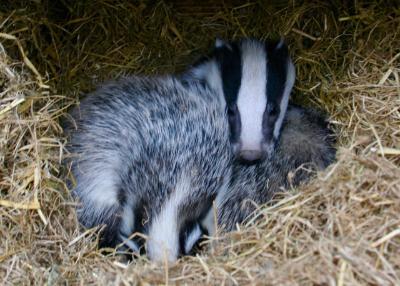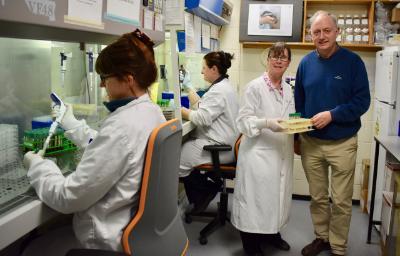UCD Centre for Veterinary Epidemiology and Risk Analysis
Guiding Animal Health Policy in Ireland and Across Europe
The UCD Centre for Veterinary Epidemiology and Risk Analysis (CVERA) works at the science-policy interface, providing scientific evidence to support policy decision-making in Ireland on a diverse range of issues relevant to animal health & welfare and public health. CVERA addresses a wide range of issues, from constraints to and opportunities for the eradication of bovine tuberculosis in cattle through to an improved understanding of biosecurity and disease threats within the farmed salmon industry. With each issue, the research of CVERA is generally highly applied and is undertaken in response to a clear policy need, as identified by the Department of Agriculture, Food and the Marine (DAFM). (Image: CVERA created a visualisation of cattle movements in Ireland during 2016 - (opens in a new window)click here to watch the video) 
CVERA also played a vital role in the establishment of Animal Health Ireland (AHI), a national partnership organisation that tackles animal health issues in Ireland that are outside the remit of government responsibility. As part of its current portfolio of projects, CVERA conducts research in support of each of AHI’s key national programmes, including CellCheck (focusing on national milk quality), the eradication of bovine viral diarrhoea (BVD) and the control of Johne’s disease.
Professor Simon More, the CVERA Director, also chairs the Scientific Committee of the European Food Safety Authority (EFSA) where scientific evidence from EU member states and elsewhere is reviewed and distilled, to assist with policy decision-making by the European Commission.
The work of CVERA is undertaken by a dedicated team of scientists from diverse scientific disciplines including veterinary epidemiology, biostatistics, geographic information systems (GIS) science, database management and ecology.
For more on CVERA see: www.ucd.ie/cvera
- (opens in a new window)Simon More
- (opens in a new window)Guy McGrath
- (opens in a new window)Daniel Collins
- Jamie Tratalos
- Jamie Madden
- Nicola Harvey
- Ann Barber
- Miriam Casey
Click on the links below to access the CVERA E-Zine:
- CVERA E-Zine - February 2024
- CVERA E-Zine - October 2023
- CVERA E-Zine - June 2023
- CVERA E-Zine - March 2023
- CVERA E-Zine - November 2022
- CVERA E-Zine - May 2022
- CVERA E-Zine - February 2022
- CVERA E-Zine - October 2021
- CVERA E-Zine - May 2021
- CVERA E-Zine - February 2021
- CVERA Ezine - October 2020
- CVERA E-Zine - May 2020
- CVERA E-Zine - February 2020
- CVERA E-Zine - October 2019
- CVERA E-Zine - May 2019
- CVERA E-Zine - February 2019
- CVERA E-Zine - October 2018
- CVERA E-Zine - May 2018
- CVERA E-Zine - February 2018
- CVERA E-Zine - October 2017
Tuberculosis Diagnostics & Immunology Research Laboratory
Director: Professor Eamonn Gormley
Overiew
The Tuberculosis Diagnostics and Immunology Research Laboratory engages in key areas of nationally important research relating to eradication of tuberculosis (Tb) from cattle and wildlife. In recent years, there has been an improvement in the incidence rate of Tb in the national herd and the Dept of Agriculure, Food & the Marine (DAFM) has embarked on an ambitious strategy to achieve Tb eradication by 2030. The UCD laboratory is at the heart of the strategy by generating scientific evidence to support the various components of the eradication programme, and contributes to the Tb testing programme in cattle and the control of the disease in badgers.
The Gamma-interferon (IFN-γ) Assay Testing and Research Laboratory
The IFN-γ diagnostic test was first developed in the late 1980’s during the latter stages of the bTB eradication programme in Australia. Since then, it has been used widely in many countries with ongoing bTB problems, including Ireland. The principle of the assay is to use ELISA methodology to detect and quantify release of the IFN-g cytokine when heparinised whole blood is cultured with bovine and avian (PPD) tuberculin. Results from experimental and natural infections of cattle indicate that the assay can detect a cell-mediated immunological (CMI) response to infection as early as 14 days post-infection, and earlier than the tuberculin test. 
The IFN-γ is most often used as an ancillary diagnostic test carried out concurrently and in parallel with the tuberculin skin test, and is strategically used to detect the maximum number of infected animals in M. bovis exposed herds. This allows for the detection of additional infected animals that would otherwise be considered negative, if the tuberculin test alone had been used. The assay is used as a tool by DAFM to assist in the diagnosis of bovine Tb from the national herd. In the period 2015-2018 approx. 175,000 blood samples from the national herd were submitted to the UCD laboratory for testing. The samples originate mainly from:
- Bovine Tb reactor re-test herds, where the IFN-γ test is used to diagnose infected animals that are false-negative to the single intradermal comparative tuberculin test (SICTT)
- Bovine Tb SICTT reactor animals where the IFN-γ test is used to confirm the exposure status of SICTT positive animals
Arising from the many thousands of samples tested each year at UCD, there is a focus, in collaboration with CVERA, on analysing the data to gauge the performance of the test under Irish conditions and searching for ways to improve the accuracy of testing. The laboratory conducts basic research with a view to improving the performance of the assay through studying and manipulating the complex network of cytokines involved in the immune response to Tb infection, in particular the role of the IL-10 cytokine in regulation of IFN-γ production in the IFN-γ Bovigam assay. The laboratory is also involved in studies using the IFN-γ assay to estimate the potency of tuberculin in infected cattle and works closely with groups based at UCD and elsewhere to use advanced transcriptomic tests to better understand the specific immune responses to infection with tuberculosis. As progession towards disease eradication advances there will be a continuous requirement to monitor all aspects of IFN-ɣ diagnostic testing to ensure that it remains fit for purpose.
The Badger Tb Vaccine Development Programme
The epidemiology of tuberculosis in badgers, including the impact of transmission of infection to cattle is well established in Ireland. Current policies to eradicate the disease are largely focused on surveillance testing of cattle supplemented with badger population control measures in areas considered as high risk for cross-species transmission. It is recognized that it is unlikely that eradication of tuberculosis in cattle can be achieved if the infection reservoir of M. bovis infection in badgers is not adequately addressed. The development of a vaccination strategy targeted at badgers is judged as a potentially feasible option. A key objective of vaccination is to reduce the transmission rate of infection within the badger population or to alter the pathology of the infection to the extent that it decreases the rate of excretion of M. bovis and transmission to cattle. 
Currently the only available vaccine against TB is the BCG vaccine developed from an infectious M. bovis strain isolated from a diseased cow between 1908 and 1921. This is the standard vaccine used worldwide to control tuberculosis, particularly in children. In Ireland, we have shown that vaccination of badgers with BCG results in protection against tuberculosis. Over the course of many studies with captive badgers, the laboratory has demonstrated that vaccination of badgers with BCG by any number of routes, including oral delivery, generates high levels of protective immunity against challenge with M. bovis. The laboratory was also responsible for providing scientific direction to the Co. Kilkenny badger vaccine field trial (the largest world-wide field trial of BCG vaccination of wildlife), which demonstrated high levels of protective immunity conferred by BCG under natural conditions. With a national vaccine implementation strategy currently underway, the laboratory is providing the key scientific support to underpin the delivery of the strategy.
In addition to the vaccination research programme, the UCD laboratory is also contributing to the development and validation of new serological tests for diagnosis of tuberculosis in badgers (in collaboration wth APHA, UK). It has already been established that the sensitivity of immunodiagnostic assays improves as the disease severity increases and that this is more pronounced with the serological based assays. In recent years, a number of new serological test platforms have been developed but have not been subject to robust validation. We are contributing samples and expertise to joint Ireland - UK studies to validate a number of these tests.
Gamma-interferon (IFN-γ) Blood Testing and Research 
- Eamonn Gormley
- Mairéad Doyle
- Tara Fitzsimons
- Kevina McGill
Badger Vaccine Development
- Eamonn Gormley
- Leigh Corner
- Naomi Fogarty
- Tara Fitzsimons
- Kevina McGill